How to install the app on iOS
Follow along with the video below to see how to install our site as a web app on your home screen.
Note: This feature may not be available in some browsers.
You are using an out of date browser. It may not display this or other websites correctly.
You should upgrade or use an alternative browser.
You should upgrade or use an alternative browser.
Pakistan Automobile Industry
- Thread starter ghazi52
- Start date
ghazi52
PDF THINK TANK: ANALYST

- Joined
- Mar 21, 2007
- Messages
- 102,918
- Reaction score
- 106
- Country
- Location
Pakistan Auto Show 2017

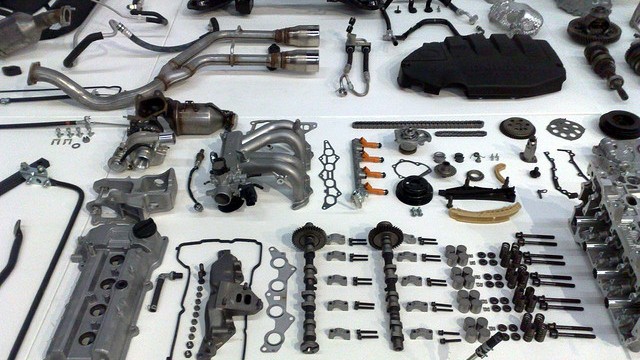



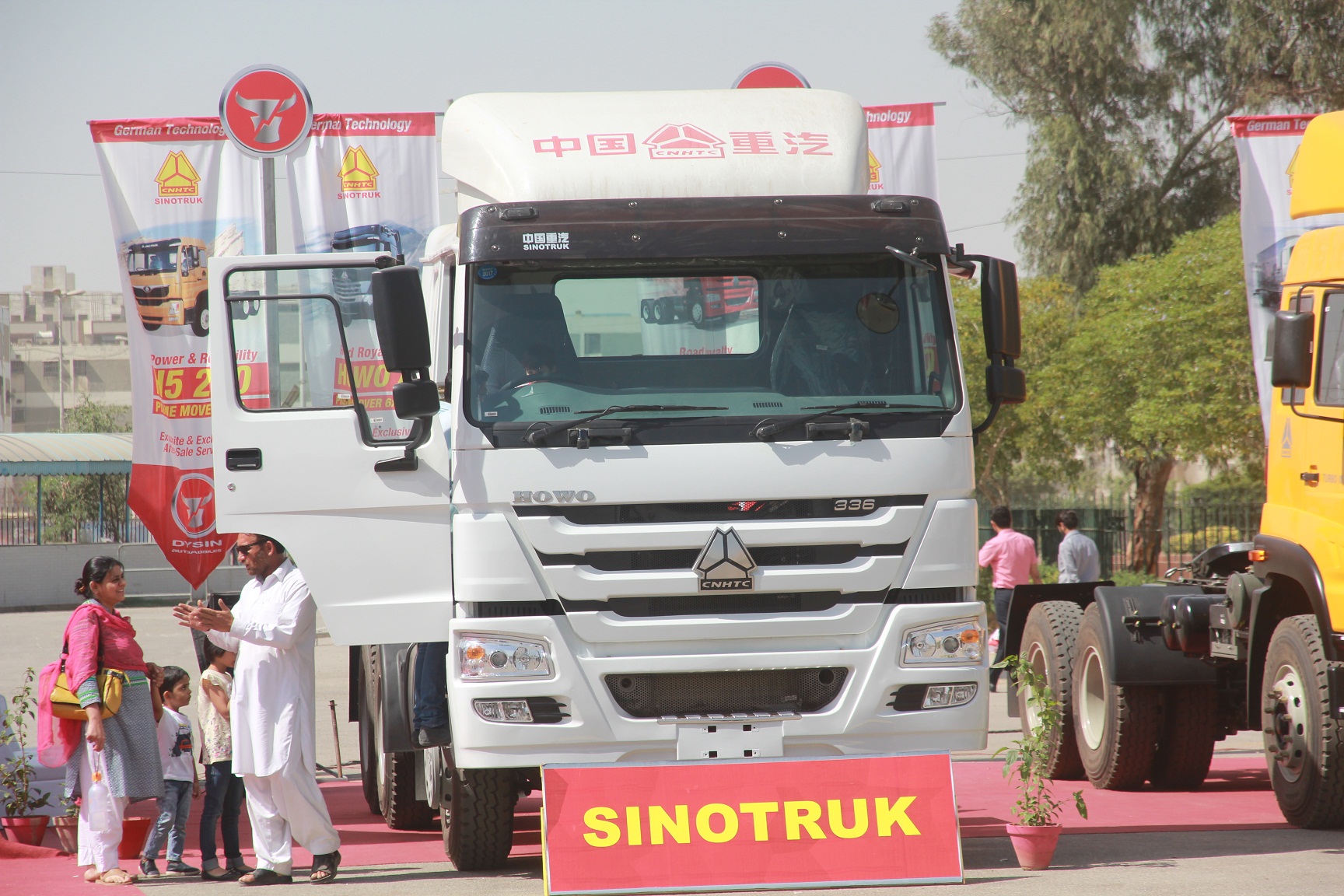


The Indus Motor Company (IMC) formally launched its new variants in the commercial vehicle and SUV range, the Hilux Revo and Fortuner.
“To develop the Hilux and Fortuner, we took a radical approach to design, travelling across the world including Pakistan to observe and feel road conditions, drive patterns, traffic situations and listen to customers and dealers first hand,” said H Nakajima, Chief Engineer Hilux and Fortuner, while speaking at the launch.

“The bigger tougher Hilux started from a new frame, an improved engine, new 6 speed transmission and a longer leaf suspension that offers more efficiency, stress free and comfortable drive.”
While commenting on the new launch, IMC Chief Operating Officer Ali Asghar Jamali said that Pakistan is one of the fastest growing economies in the region and that is a good implication for the auto industry.
“If the present optimism persists, we foresee the market touching 350,000 units of demand by 2025, and if new entrants step in; the demand may go up to 500,000 units.
Talking about IMC’s localisation efforts, he said, “With continuous localisation, we not only save valuable foreign exchange for the country but also are able to offer our vehicles at much competitive prices. It is interesting to note that our cars, adjusted for dollar appreciation, cost less today than they did back in 1993,” added Jamali.
_









The Indus Motor Company (IMC) formally launched its new variants in the commercial vehicle and SUV range, the Hilux Revo and Fortuner.
“To develop the Hilux and Fortuner, we took a radical approach to design, travelling across the world including Pakistan to observe and feel road conditions, drive patterns, traffic situations and listen to customers and dealers first hand,” said H Nakajima, Chief Engineer Hilux and Fortuner, while speaking at the launch.

“The bigger tougher Hilux started from a new frame, an improved engine, new 6 speed transmission and a longer leaf suspension that offers more efficiency, stress free and comfortable drive.”
While commenting on the new launch, IMC Chief Operating Officer Ali Asghar Jamali said that Pakistan is one of the fastest growing economies in the region and that is a good implication for the auto industry.
“If the present optimism persists, we foresee the market touching 350,000 units of demand by 2025, and if new entrants step in; the demand may go up to 500,000 units.
Talking about IMC’s localisation efforts, he said, “With continuous localisation, we not only save valuable foreign exchange for the country but also are able to offer our vehicles at much competitive prices. It is interesting to note that our cars, adjusted for dollar appreciation, cost less today than they did back in 1993,” added Jamali.
_

ghazi52
PDF THINK TANK: ANALYST

- Joined
- Mar 21, 2007
- Messages
- 102,918
- Reaction score
- 106
- Country
- Location
Al-Haj FAW Successfully Initiates e-Coat Painting Facility
Another day brings another beginning for the Pakistani automotive consumers. With the acquisition of more than 8 acres of land and a mind-boggling investment of 600 million rupees, Al-Haj FAW has installed a state-of-the-art Electro Deposition (e-Coat) Paint facility at its automobile manufacturing unit. The Chinese Owned Company’s subsidiary in Pakistan has proven its mantle repeatedly with its ability to offer any type of ‘Product Mix’ with regards to Pakistani automotive market. Be it passenger vehicles, light or heavy vehicles; the company has done it all and attained the sales figures as a proof to cement its status as a quickly rising fourth auto manufacturer in Pakistan.
Another day brings another beginning for the Pakistani automotive consumers. With the acquisition of more than 8 acres of land and a mind-boggling investment of 600 million rupees, Al-Haj FAW has installed a state-of-the-art Electro Deposition (e-Coat) Paint facility at its automobile manufacturing unit. The Chinese Owned Company’s subsidiary in Pakistan has proven its mantle repeatedly with its ability to offer any type of ‘Product Mix’ with regards to Pakistani automotive market. Be it passenger vehicles, light or heavy vehicles; the company has done it all and attained the sales figures as a proof to cement its status as a quickly rising fourth auto manufacturer in Pakistan.
Danish saleem
SENIOR MEMBER

- Joined
- Mar 27, 2014
- Messages
- 2,231
- Reaction score
- 1
- Country
- Location
What happen to Adam Motors, and their Revo Car?
ghazi52
PDF THINK TANK: ANALYST

- Joined
- Mar 21, 2007
- Messages
- 102,918
- Reaction score
- 106
- Country
- Location
A Local car manufacture company has manufactured electric rickshaw with air conditioning in Pakistan.
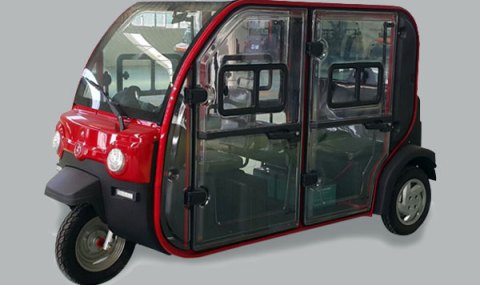
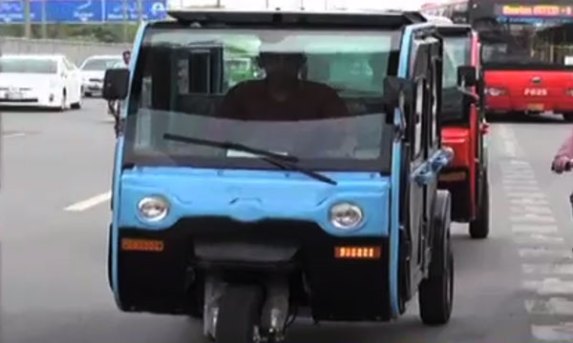
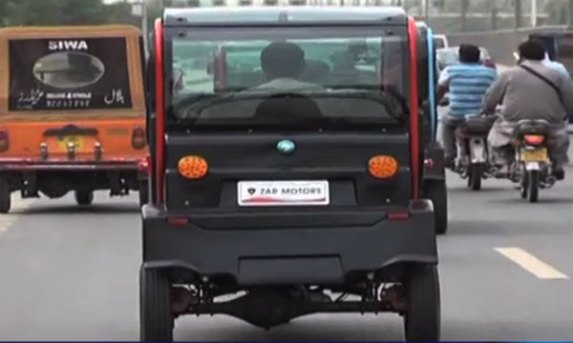
http://www.brandsynario.com/rickshaw...un-petrol-gas/
Features
No dependency on CNG and patrol is the prime quality of these electric rickshaws and loaders. The rest of the features of these electric vehicles are:
SPECIFICATION
Model name MINI CAB (Sunshine Z5)
Type 3 Wheeler
Sitting Capacity Driver + 3 Passengers
Charging voltage 220v, 50 hz
Charging time* 80% charging in 2 hours, 100% charging in 3 to 4 hours
Reverse Gear Yes
Batteries Gel Batteries (Maintenance Free)
PERFORMANCE
Attainable Speed 45 km/h
Mileage 130 to 150 km (in one charging)




http://www.brandsynario.com/rickshaw...un-petrol-gas/
Features
No dependency on CNG and patrol is the prime quality of these electric rickshaws and loaders. The rest of the features of these electric vehicles are:
- No noise
- Very low maintenance cost
- Environmental friendly
- Easy availability of spare parts
- Spacious and comfortable seats
- Electric wiper
- FM/AM Radio & MP3 Player
- Simple charging system like cell phone
SPECIFICATION
Model name MINI CAB (Sunshine Z5)
Type 3 Wheeler
Sitting Capacity Driver + 3 Passengers
Charging voltage 220v, 50 hz
Charging time* 80% charging in 2 hours, 100% charging in 3 to 4 hours
Reverse Gear Yes
Batteries Gel Batteries (Maintenance Free)
PERFORMANCE
Attainable Speed 45 km/h
Mileage 130 to 150 km (in one charging)

ghazi52
PDF THINK TANK: ANALYST

- Joined
- Mar 21, 2007
- Messages
- 102,918
- Reaction score
- 106
- Country
- Location
Tractor production increases 59.65pc in 11 months
ISLAMABAD: Tractors production in the country during 11 months of previous financial year increased by 59.65 percent as compared the production of corresponding period of last year.
During the period from July-May, 2016-17, about 50,049 tractors were manufactured in the country against the manufacturing of 31,350 tractors of same period last year.
On month on month basis, 5,746 tractors were produced in Month of May, 2017 as compared the production of 4,735 tractors of same period last year, according the computation of quantum index numbers of large scale manufacturing industries released by Pakistan Bureau of Statistics (PBS).
Meanwhile, production of jeeps and cars increased by 6.28 percent during first eleven months of the fiscal year 2016-17 compared to the output of the corresponding period of last year.
As many as 178,944 jeeps and cars were manufactured during July-May (2016-17) compared to the production of 168,363 units during July-May (2015-16).
On year-on-year basis, the production of cars and jeeps witnessed 19.35 percent growth during May 2017 compared to the same month of last year, according to the data. It added that 18,094 cars were manufactured during May 2017 against the production of 15,161 units during last May.
Meanwhile, the production of motorcycles during the first eleven months of the fiscal year 2016-17 increased by 21.85 percent compared to the production of last year.
As many as 2,294,708 motorcycles were manufactured during July-May (2016-17) compared to the production of 1,883,298 during July-May (2015-16), the data revealed.
The production of buses and trucks also increased by 4.93 percent and 40.26 percent respectively during the period under review.
The bus production increased from 994 units last year to 1,043 units in 2016-17 while the truck production increased from 5,065 units to 7,104 units.
Similarly, the production of trucks during May 2017 increased by 48.04 percent by going up from 587 units to 859 units during last May while the production of tractors also increased by 21.35 percent by increasing from 4,735 last May to 5,746 units during May 2017.
However, the production of buses decreased by 35.94 percent during the month under review as it decreased from 128 units in May 2016 to 82 units in 2017.

ISLAMABAD: Tractors production in the country during 11 months of previous financial year increased by 59.65 percent as compared the production of corresponding period of last year.
During the period from July-May, 2016-17, about 50,049 tractors were manufactured in the country against the manufacturing of 31,350 tractors of same period last year.
On month on month basis, 5,746 tractors were produced in Month of May, 2017 as compared the production of 4,735 tractors of same period last year, according the computation of quantum index numbers of large scale manufacturing industries released by Pakistan Bureau of Statistics (PBS).
Meanwhile, production of jeeps and cars increased by 6.28 percent during first eleven months of the fiscal year 2016-17 compared to the output of the corresponding period of last year.
As many as 178,944 jeeps and cars were manufactured during July-May (2016-17) compared to the production of 168,363 units during July-May (2015-16).
On year-on-year basis, the production of cars and jeeps witnessed 19.35 percent growth during May 2017 compared to the same month of last year, according to the data. It added that 18,094 cars were manufactured during May 2017 against the production of 15,161 units during last May.
Meanwhile, the production of motorcycles during the first eleven months of the fiscal year 2016-17 increased by 21.85 percent compared to the production of last year.
As many as 2,294,708 motorcycles were manufactured during July-May (2016-17) compared to the production of 1,883,298 during July-May (2015-16), the data revealed.
The production of buses and trucks also increased by 4.93 percent and 40.26 percent respectively during the period under review.
The bus production increased from 994 units last year to 1,043 units in 2016-17 while the truck production increased from 5,065 units to 7,104 units.
Similarly, the production of trucks during May 2017 increased by 48.04 percent by going up from 587 units to 859 units during last May while the production of tractors also increased by 21.35 percent by increasing from 4,735 last May to 5,746 units during May 2017.
However, the production of buses decreased by 35.94 percent during the month under review as it decreased from 128 units in May 2016 to 82 units in 2017.

ghazi52
PDF THINK TANK: ANALYST

- Joined
- Mar 21, 2007
- Messages
- 102,918
- Reaction score
- 106
- Country
- Location
Locally assembled faw V2's roll out at brand new assembly line at Al Haj FAW
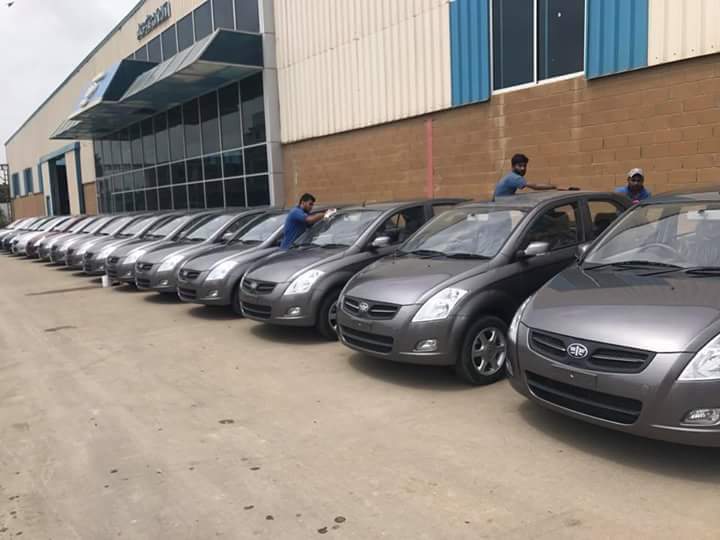
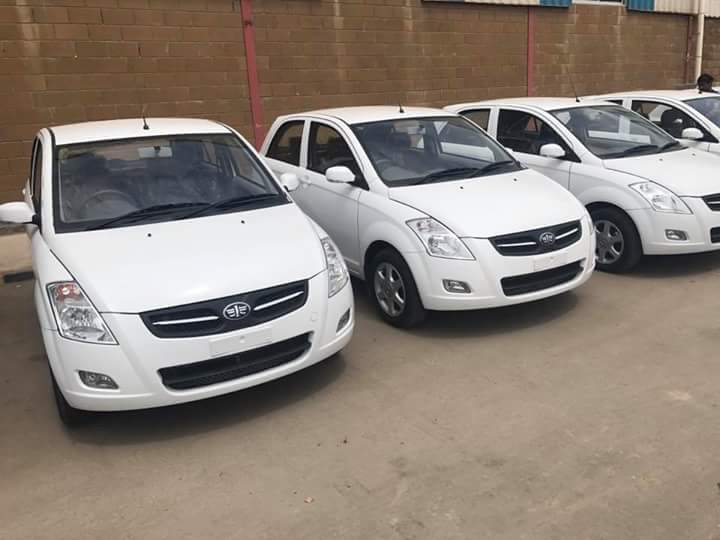
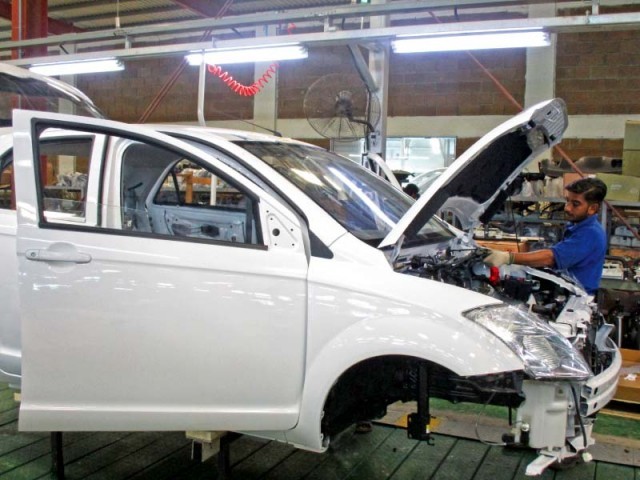
KARACHI: The first Chinese passenger car is now being produced in Pakistan, a market that is currently dominated by three Japanese carmakers.
Al-Haj Faw Motors (Private) Limited, a collaboration between Faw China and a commercial importer of heavy vehicles Al-Haj Motors, has started assembling Faw V2, a 1,300cc hatchback, at its assembly plant in Karachi.
The company was importing Completely Built Units (CBU) of V2 for the last two years to see market response. Now that it is satisfied with the response, it has decided to produce the car locally to compete with well-established Japanese brands.
"We want to become the export base of Faw for export of cars to Southeast Asia and African markets,” Al-Haj Faw Motors Managing Director Bilal Afridi said on Saturday at a ceremony organised at the company plant.
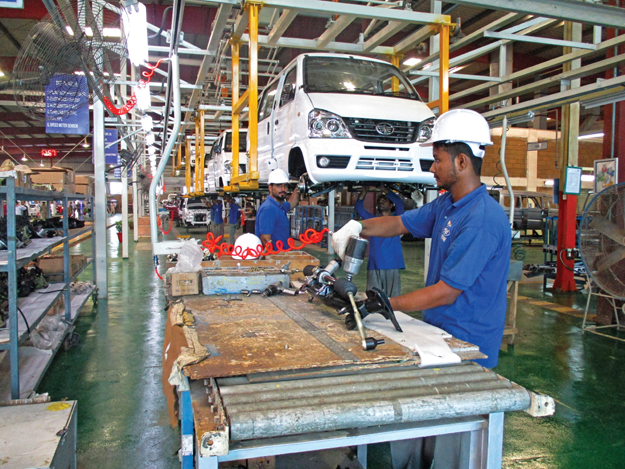
The company initially targets to produce 300 units of V2 per month and then increase the production level to 500 units by the end of 2017. Currently, the company has over 600 workers and its annual capacity is 10,000 units (single shift) that will be increased to 15,000 units by 2020.
The company has recently invested Rs1.3 billion to improve the assembly plant, apart from its initial investment of Rs2.5 billion in the company.
The current price of Faw V2 is Rs1.069 million Company officials say they have only increased the price by Rs20,000 in over two years to make it an attractive product and compete well with the Japanese competitors.
Its Japanese competitor Pak Suzuki’s Swift, another hatchback with a 1,300cc engine, is available for Rs1.327 million (prices of its automatic variants go up to Rs1.511 million).
“I think they (Al-Haj Faw Motors) are maintaining a very good quality, something they should do because they have to compete with Japanese brands,” Pakistan Association of Automotive Parts and Accessories Manufacturers (Paapam) Chairman Mashood Ali Khan told The Express Tribune while inspecting a Faw V2 on the assembly line.
Company officials say they wanted to produce Chinese passenger cars and light commercial vehicles (LCVs) locally for a long time, but delay on the part of the government (from 2013 to 2016) in announcing a new auto policy interrupted the planned investments.
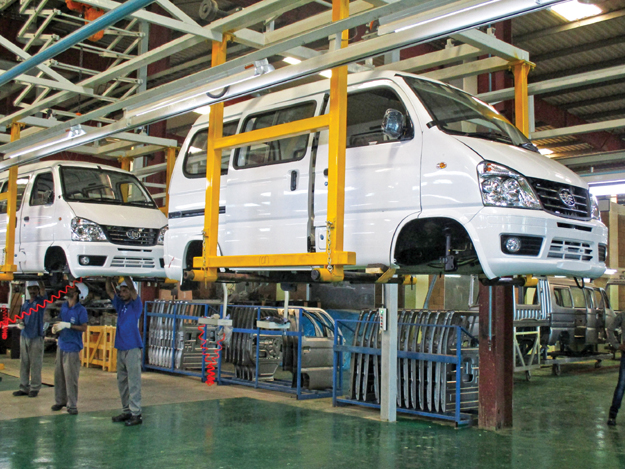
Al-Haj Faw Motors has been assembling trucks since October 2011 while its plant is also capable of producing LCVs and passenger cars.
The Al-Haj Group has been present in Pakistan since 1960 when it started trading in different products like tyres, textiles and electronic goods.
The group, in May 2017, launched a separate company, Al-Haj Hyundai (Pvt) Limited, which will invest about Rs4 billion in producing Hyundai trucks and buses in Pakistan.
Chinese vehicles, led by Faw, are gradually getting a good response from the market, which has historically been dominated by Japanese companies.
Chinese brands have faced difficulty in the presence of Japanese and Korean companies that have enjoyed production facilities in Pakistan. However, the situation is going to change with the first locally produced Chinese car in the market.
Although Faw V2 has a distinct customer base, some analysts say it could take the market share of used cars that have caught the attention of Pakistanis for over a decade and a half. Pakistan currently imports over 45,000 used cars annually.
Analysts say growing middle class, better macroeconomic indicators and easily available car financing are some of the top reasons why car sales are continuously growing in Pakistan.
After over seven years of slowdown in the automobile industry, the country is once again producing over 250,000 units of LCVs, jeeps and cars annually.



KARACHI: The first Chinese passenger car is now being produced in Pakistan, a market that is currently dominated by three Japanese carmakers.
Al-Haj Faw Motors (Private) Limited, a collaboration between Faw China and a commercial importer of heavy vehicles Al-Haj Motors, has started assembling Faw V2, a 1,300cc hatchback, at its assembly plant in Karachi.
The company was importing Completely Built Units (CBU) of V2 for the last two years to see market response. Now that it is satisfied with the response, it has decided to produce the car locally to compete with well-established Japanese brands.
"We want to become the export base of Faw for export of cars to Southeast Asia and African markets,” Al-Haj Faw Motors Managing Director Bilal Afridi said on Saturday at a ceremony organised at the company plant.

The company initially targets to produce 300 units of V2 per month and then increase the production level to 500 units by the end of 2017. Currently, the company has over 600 workers and its annual capacity is 10,000 units (single shift) that will be increased to 15,000 units by 2020.
The company has recently invested Rs1.3 billion to improve the assembly plant, apart from its initial investment of Rs2.5 billion in the company.
The current price of Faw V2 is Rs1.069 million Company officials say they have only increased the price by Rs20,000 in over two years to make it an attractive product and compete well with the Japanese competitors.
Its Japanese competitor Pak Suzuki’s Swift, another hatchback with a 1,300cc engine, is available for Rs1.327 million (prices of its automatic variants go up to Rs1.511 million).
“I think they (Al-Haj Faw Motors) are maintaining a very good quality, something they should do because they have to compete with Japanese brands,” Pakistan Association of Automotive Parts and Accessories Manufacturers (Paapam) Chairman Mashood Ali Khan told The Express Tribune while inspecting a Faw V2 on the assembly line.
Company officials say they wanted to produce Chinese passenger cars and light commercial vehicles (LCVs) locally for a long time, but delay on the part of the government (from 2013 to 2016) in announcing a new auto policy interrupted the planned investments.

Al-Haj Faw Motors has been assembling trucks since October 2011 while its plant is also capable of producing LCVs and passenger cars.
The Al-Haj Group has been present in Pakistan since 1960 when it started trading in different products like tyres, textiles and electronic goods.
The group, in May 2017, launched a separate company, Al-Haj Hyundai (Pvt) Limited, which will invest about Rs4 billion in producing Hyundai trucks and buses in Pakistan.
Chinese vehicles, led by Faw, are gradually getting a good response from the market, which has historically been dominated by Japanese companies.
Chinese brands have faced difficulty in the presence of Japanese and Korean companies that have enjoyed production facilities in Pakistan. However, the situation is going to change with the first locally produced Chinese car in the market.
Although Faw V2 has a distinct customer base, some analysts say it could take the market share of used cars that have caught the attention of Pakistanis for over a decade and a half. Pakistan currently imports over 45,000 used cars annually.
Analysts say growing middle class, better macroeconomic indicators and easily available car financing are some of the top reasons why car sales are continuously growing in Pakistan.
After over seven years of slowdown in the automobile industry, the country is once again producing over 250,000 units of LCVs, jeeps and cars annually.
ghazi52
PDF THINK TANK: ANALYST

- Joined
- Mar 21, 2007
- Messages
- 102,918
- Reaction score
- 106
- Country
- Location
Chinese companies to assemble trucks, buses in Pakistan
KARACHI: Two Chinese auto companies — truck maker Sinotruck Limited and bus manufacturer Shanghai Sunlong — on Friday expressed interest in establishing assembling units in Pakistan.
In a meeting with the office-bearers of Pakistan Association of Auto Parts and Accessories Manufacturers Association (Paapam), Sinotruck’s Mr Wang Haotao, who was leading a 10-member Chinese delegation, said his company aims to utilise Pakistani expertise and labour in the production of auto parts for their trucks.
He informed the auto- part makers that his company had already exported 2,400 completely built-up trucks to Pakistan. Sinotruck produces 200,000 units per annum in China.
Chairman Paapam Mashood Ali Khan said Sinotruck officials are conducting a survey of the Pakistani truck market and will submit a report to their higher-ups.
He said he had asked the Chinese company to also bring auto-part makers in future meetings so that joint ventures and technical agreements could be signed.
The Chinese delegates were also told about the growing auto industry of Pakistan and China’s growing involvement in the production of motorcycles, cars, buses, and trucks, and also in the production of their auto parts.
Euro II-compliant buses Also on Friday, the formal launch of Sunlong buses was held in the city.
On the occasion, it was disclosed that a possibility has emerged that latest Chinese buses fitted with Euro II-compliant engines would be used for plying on the Green Line and Orange Line routes – the first two sections of the Rapid Bus Transit Service (RBTS) being constructed in Karachi.
However, the Sindh Government has yet to formally invite bids to procure buses for the said transit lines.
Nadeem Mirza, CEO of My Trading, one of the two importers of Sunlong buses in Pakistan, claimed that this was the first time large buses fitted with Euro II- compliant technology were being brought into Pakistan.
He said that these buses were equally useful for both inter-city and intra-city routes.
He said that his company was in touch with the Sindh government to explore the possibility of plying similar buses on Green Line and Orange Line sections of BRTS in Karachi.
In the first phase, some 100 Sunlong buses would be imported in next six months to get them operational on mostly inter-city routes all over the country. Agreements have already been signed for purchase and operations of 32 such buses.
Malik Khuda Baksh, chairman of Malik Group of Companies, said his company has decided to import modern passenger buses from China after successfully negotiating with banks and leasing companies.
Leasing facility and insurance coverage would be available to prospective public transporters who would decide to launch a fleet of Sunlong buses on different routes of the province, he added.
In the next stage, the assembling plant for such modern buses would also be established near Thatta, he added.
The Sindh government is required to spend Rs2 billion for procuring around 80 buses for the Green Line section of the BRTS while another 30 buses will also be procured for the Orange Line Bus Service.
KARACHI: Two Chinese auto companies — truck maker Sinotruck Limited and bus manufacturer Shanghai Sunlong — on Friday expressed interest in establishing assembling units in Pakistan.
In a meeting with the office-bearers of Pakistan Association of Auto Parts and Accessories Manufacturers Association (Paapam), Sinotruck’s Mr Wang Haotao, who was leading a 10-member Chinese delegation, said his company aims to utilise Pakistani expertise and labour in the production of auto parts for their trucks.
He informed the auto- part makers that his company had already exported 2,400 completely built-up trucks to Pakistan. Sinotruck produces 200,000 units per annum in China.
Chairman Paapam Mashood Ali Khan said Sinotruck officials are conducting a survey of the Pakistani truck market and will submit a report to their higher-ups.
He said he had asked the Chinese company to also bring auto-part makers in future meetings so that joint ventures and technical agreements could be signed.
The Chinese delegates were also told about the growing auto industry of Pakistan and China’s growing involvement in the production of motorcycles, cars, buses, and trucks, and also in the production of their auto parts.
Euro II-compliant buses Also on Friday, the formal launch of Sunlong buses was held in the city.
On the occasion, it was disclosed that a possibility has emerged that latest Chinese buses fitted with Euro II-compliant engines would be used for plying on the Green Line and Orange Line routes – the first two sections of the Rapid Bus Transit Service (RBTS) being constructed in Karachi.
However, the Sindh Government has yet to formally invite bids to procure buses for the said transit lines.
Nadeem Mirza, CEO of My Trading, one of the two importers of Sunlong buses in Pakistan, claimed that this was the first time large buses fitted with Euro II- compliant technology were being brought into Pakistan.
He said that these buses were equally useful for both inter-city and intra-city routes.
He said that his company was in touch with the Sindh government to explore the possibility of plying similar buses on Green Line and Orange Line sections of BRTS in Karachi.
In the first phase, some 100 Sunlong buses would be imported in next six months to get them operational on mostly inter-city routes all over the country. Agreements have already been signed for purchase and operations of 32 such buses.
Malik Khuda Baksh, chairman of Malik Group of Companies, said his company has decided to import modern passenger buses from China after successfully negotiating with banks and leasing companies.
Leasing facility and insurance coverage would be available to prospective public transporters who would decide to launch a fleet of Sunlong buses on different routes of the province, he added.
In the next stage, the assembling plant for such modern buses would also be established near Thatta, he added.
The Sindh government is required to spend Rs2 billion for procuring around 80 buses for the Green Line section of the BRTS while another 30 buses will also be procured for the Orange Line Bus Service.
Similar threads
- Replies
- 0
- Views
- 409
- Replies
- 0
- Views
- 516
- Replies
- 1
- Views
- 563
- Replies
- 0
- Views
- 370
















